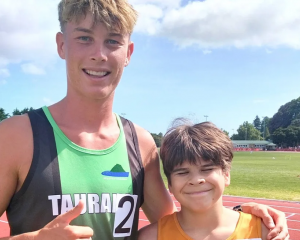That era was heralded by an increasing intensity of competition in the 1960s by young athletes determined to knock experienced senior athletes such as Peter Welsh and Pat Sidon off their perch.
The same is true today, with teenage athletes challenging the older runners.
This happened at the Otago 3000m championships last month when teenage runners filled four of the top five places.
The race was won by 17-year-old Bryce Morgan (Ariki) in a personal-best time of 8min 42.50sec.
Otago has been represented at recent international events, with sprinter Todd Johnston (Ariki) contesting the Commonwealth Youth Games in India.
Nine athletes are currently competing at the Pacific Schools Games in Canberra, and Toby Flett and Biddy Skerten have been selected for the Australian Youth Olympic Festival in Sydney next month.
Otago has a vigorous coaching system, with Joan Merrilees and her daughter, Megan, getting New Zealand appointments for international events.
Brent Ward is the country's top sprint coach.
Much the credit for the resurgence of Otago athletics must be given to Sport Otago's Mike Weddell and the Sports Force programme taking the athletics message to schools throughout Otago.
The work of Otago Secondary Schools regional sports director Des Smith has also played a key role in increasing the numbers and lifting the standards at secondary school championships in Otago.
The 1970s boom era really started in 1969 when Sylvia Potts won the first of her two New Zealand 800m titles and almost hit the jackpot in the Commonwealth Games 1500m in Edinburgh the following year when she collapsed 2m from the finish when heading for the gold medal.
Early in 1971, Dick Tayler became the first Otago runner to crack the 4min mile barrier when he ran 3min 58.8sec at the Caledonian Ground.
Tayler's gold medal win in the 10,000m at the 1974 Commonwealth Games has been well documented.
It came because he had been pushed in training and racing by other Otago athletes in the six years he lived in Dunedin.
Otago had five athletes in the New Zealand team in Christchurch, with the best performed Sandra McGookin (sixth in javelin) and Euan Robertson (fifth in 3km steeplechase).
Lorraine Moller, a student at the University of Otago School of Physical Education at the time, was fifth in the 800m.
She did most of her training with Otago runners in Dunedin.
A year later, Moller and Robertson both finished fifth at the world cross-country in Morocco.
The New Zealand men won the gold medal in the team event and the women were second.
It was a successful decade for Robertson who finished sixth in the 3km steeplechase at the Olympic Games in Montreal in 1976 and fourth in the same event at the Edmonton Commonwealth Games in 1978.
He was also sixth in the world cross-country in 1977.
During the decade Stuart Melville won five New Zealand senior track titles.
At the end of the 1970s Chip Dunckley won the national senior men's cross-country title.
John Campbell, one of the young athletes pushing the boundaries in the late 1960s, came into his own during the 1980s when, at the age of 39, he became the oldest runner to win the senior men's cross-country title and finished 12th in the Olympic marathon in Seoul in 1988.
The number of athletes competing today is also growing, with 44 runners finishing the three 3000m championship races.
The sprints and the throws are other events attracting big numbers this season and challenging the incumbents.










